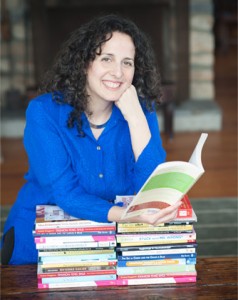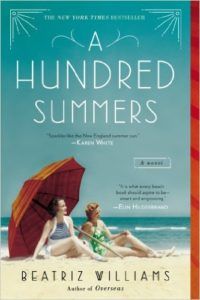 You’re writing a self-help book. Is fiction relevant?
You’re writing a self-help book. Is fiction relevant?
I believe so—and not just in order to justify my recent habit of staying up late reading beach novels. (Good ones, of course. The kind you can’t put down.)
Hear me out.
I’m still thinking about the characters, wondering how the plot will resolve in Beatriz Williams’ A Hundred Summers as I make my morning smoothie. The book stays with me. I want to get back to it and find out what happens next.
My friend, Robin Kall, introduced me to Williams’ novels through the Summer Reading with Robin author event at the Dunes Club last year (and again this year).
 One reason Beatriz’ books are so compelling is her mastery of suspense. Both A Hundred Summers and the Along the Infinite Sea alternate between past and more recent past, two periods in time. As the more recent story unfolds, we get closer and closer to the distant past that has led us to the current situation.
One reason Beatriz’ books are so compelling is her mastery of suspense. Both A Hundred Summers and the Along the Infinite Sea alternate between past and more recent past, two periods in time. As the more recent story unfolds, we get closer and closer to the distant past that has led us to the current situation.
So, how does this all apply to writing a self-help book? Here are 3 tips you can borrow from Beatriz Williams—or another adept novelist.
- Get your readers to care. A novelist gets us to care by creating characters we relate to, characters who are both believable and vulnerable. You can get your readers to care by sharing stories of real life characters. Their stories take the information you share and bring it to life. The more of a picture you develop of the people in your anecdotes, the more your readers will connect and care. Another way to get readers to care, when you’re writing a self-help book, is to invite your readers to reflect on their pain or passion. Perhaps offer an exercise or journaling prompt where readers can explore why they want and need this self-help book—and what results they hope to achieve.
- Be intimate. An academic tone keeps your readers at bay. Invite your readers in with a conversational tone and warmth. Imagine you are writing to one specific person (rather than a roomful of people) and your tone will naturally be more intimate.
- Create suspense. You may wonder, “How do I create suspense with a self-help book?” Don’t give your readers everything at once. Teach step by step. Hint at what readers will discover later in the book. Lead up to the gifts of the final chapter. Not only will you create some suspense but your book will be better organized and more accessible. After all, readers can only digest so much information at once.
What are some of your favorite devices of a good novel? How might you employ them in writing a self-help book? I know I’ve only touched the tip of the trilogy. I invite you to think about additional secrets of novelists that you can engage to make your self-help book compelling—and share them here on the blog as a comment!

